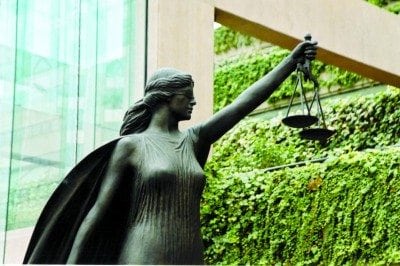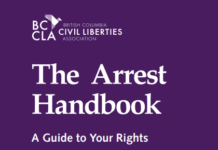THE BC Civil Liberties Association (BCCLA) on Wednesday filed a lawsuit to stop the wardens at federal prisons from unlawfully placing people in long-term solitary confinement.
The BCCLA said that across the country, wardens are isolating people in prison in long-term solitary confinement by using lockdowns and “restrictive movement routines.” During lockdowns and “restrictive movement routines,” wardens lock down entire institutions or set highly restrictive schedules that isolate people to their cells for days, weeks and months at a time. Many times, wardens lock down prisons for administrative reasons, like staff shortages or construction.
In their lawsuit, the BCCLA argues that prisons have no authority to impose prolonged, indefinite lockdowns and restrictive movement routines. They also argue these procedures violate many Charter rights and constitute solitary confinement under the Mandela Rules. International bodies have concluded that long-term solitary confinement amounts to torture.
Lockdowns and restrictive movement routines have a disproportionate impact on Indigenous and racialized people as well people with mental disabilities. These restrictions on liberty often affect Indigenous peoples’ access to Elders and ceremonies.
This is not the first time the BCCLA has fought the use of prolonged isolation in Canadian prisons. The group previously challenged the administrative segregation law and won. In 2019, the BC Court of Appeal declared that this law was unconstitutional because it authorized prolonged, indefinite solitary confinement in prisons across the country.
Despite this 2019 victory, people in prison continue to be held in prolonged isolation. “The administrative segregation law is gone, but, tragically, solitary confinement is not,” said Grace Pastine, BCCLA’s Litigation Director. “We’re going back to court because no one deserves to be held in such inhumane and degrading conditions. Putting people in extreme isolation does not lead to safer prisons or safer communities. It’s time to end this broken and dangerous system which causes extreme and sometimes permanent harm to the people who endure it.”
Megan Tweedie, Senior Counsel for the BCCLA, added: “We know that isolating people indefinitely has devastating impacts on their physical and mental health. It dramatically increases the risk of suicide. Long-term isolation does nothing to rehabilitate people in prison and exacerbates mental illness – or even causes it in people who were healthy when they entered solitary. Long-term solitary confinement by any name cannot be allowed to continue.”
Jessica Magonet, Staff Counsel for the BCCLA, noted: “An overwhelming body of evidence shows the devastating harm solitary confinement causes to the people who endure it, as well as their families and communities. The Nelson Mandela Rules demand that solitary confinement only be used in exceptional cases, as a last resort, for as short a time as possible and subject to independent review – and never for children, pregnant people and new mothers, individuals with mental illness and physical disabilities, and other vulnerable populations. It’s time to stop the wardens at federal prisons from unlawfully placing people in long-term solitary confinement.”
This lawsuit will be heard at the Supreme Court of British Columbia. The BCCLA is represented by Alison Latimer and Greg DelBigio.













